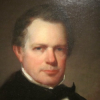William Gilmore Simms

William Gilmore Simms
William Gilmore Simmswas a poet, novelist and historian from the American South. His writings achieved great prominence during the 19th century, with Edgar Allan Poe pronouncing him the best novelist America had ever produced. He is still known among literary scholars as a major force in antebellum Southern literature. He is also remembered for his strong support of slavery and for his opposition to Uncle Tom's Cabin, in response to which he wrote reviews and a pro-slavery novel...
NationalityAmerican
ProfessionNovelist
CountryUnited States of America
Neither praise nor blame is the object of true criticism. Justly to discriminate, firmly to establish, wisely to prescribe and honestly to award - these are the true aims and duties of criticism.
Genius is the very eye of intellect and the wing of thought; it is always in advance of its time, and is the pioneer for the generation which it precedes.
The true law of the race is progress and development. Whenever civilization pauses in the march of conquest, it is overthrown by the barbarian.
Tact is one of the first mental virtues, the absence of which is often fatal to the best of talents; it supplies the place of many talents.
Not in sorrow freely is never to open the bosom to the sweets of the sunshine.
The amiable is a duty most certainly, but must not be exercised at the expense of any of the virtues. He who seeks to do the amiable always, can only be successful at the frequent expense of his manhood.
He who would acquire fame must not show himself afraid of censure. The dread of censure is the death of genius.
The proverb answers where the sermon fails.
Tears are the natural penalties of pleasure. It is a law that we should pay for all that we enjoy.
The apothegm is the most portable form of Truth.... It is thus that the proverb answers where the sermon fails, as a well-charged pistol will do more execution than a whole barrel of gunpowder idly expended in the air.
To make punishments efficacious, two things are necessary. They must never be disproportioned to the offence, and they must be certain.
We must calculate not on the weather, nor on fortune, but upon God and ourselves. He may fail us in the gratification of our wishes, but never in the encounter with our exigencies.
No errors of opinion can possibly be dangerous in a country where opinion is left free to grapple with them.
I listen to them freely and with all the respect merited by their intelligence, their character, their knowledge, reserving always my incontestable right of criticism and censure.